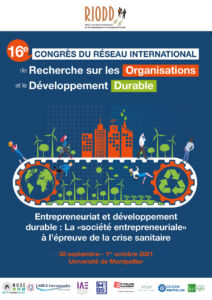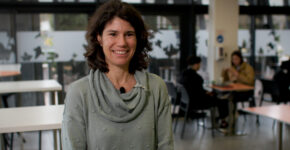Entrepreneurship and sustainable development: The "entrepreneurial society" put to the test by the health crisis
This event has passed!
Montpellier Management Espace Richter, MDE Aimé Schoenig and Building B – Rue Vendémiaire, 34960 Montpellier.
 16th Congress of the International Research Network on Organizations and Sustainable Development
16th Congress of the International Research Network on Organizations and Sustainable Development
With its sudden and brutal onset and the emergency measures it has imposed worldwide, the COVID-19 epidemic has caused a systemic crisis which, beyond purely health-related aspects, has undermined many certainties, and even beliefs, about the principles of social regulation, both nationally and internationally. It has thus starkly highlighted the fragility of the dominant economic and social models, which struggle to anticipate risks correctly and provide solutions that are indisputable in terms of both effectiveness and ethics. In this sense, it echoes the fundamental debate that RIODD has been conducting since its creation on development models and their implications for organizations. This debate focuses first on the meaning of actions, the individual and collective objectives pursued, and the order of priorities. It then focuses on the means of taking these actions and pursuing these objectives. It thus leads to questions about the respective roles and legitimacy of public authorities and private actors, and the appropriate level and type of coordination between them.
The initial objective of the 15th RIODD Congress (2020) was precisely to address this debate at the organizational level by questioning the model of the "entrepreneurial society " (D. Audretsch, 2006, 2007), which has been championed for several years by leaders in many countries as being particularly relevant to addressing major contemporary social and environmental challenges. As health constraints led to a scaled-down, remote edition of the 2020 congress, the 2021 edition should provide an opportunity to continue and deepen the debate, bringing together more than ever the perspectives of sociologists, philosophers, lawyers, historians, geographers, and ecologists, as well as those of economists and management specialists. The health crisis, through the speed and scale of the upheavals it has caused, has provided a formidable field of analysis for the "entrepreneurial society" model (and alternative models) on which the conference debates will be based, focusing on the challenges of product and service innovation, processes, and management (Schumpeter, 1935; Carland, Hoy, Boulton, and Carland, 1984) in public and private organizations, new or destroyed opportunities (Venkataraman, 1997; Shane and Venkataraman, 2000), the development or disappearance of organizations (Gartner, 1985), and the creation or destruction of economic and non-economic value (Gartner, 1990).
Government intervention, which was necessary to combat the pandemic and address the global economic and social crisis it caused, has reemphasized the irreplaceable role of governments in crisis situations. This revival of public authority, which holds sovereign powers, has been accompanied by a number of initiatives from both the business sector and civil society groups to find innovative solutions to the sometimes unprecedented problems posed by events. In a largely renewed context, the conditions are now in place for the emergence of a "balanced society" (Mintzberg, 2017) between the "three pillars" of states, markets, and organized communities (ibid.).
In the same vein of renewing the frameworks for analyzing current economic and social policies, there is the question of revising the United Nations' "Agenda 2030" and the Sustainable Development Goals (SDGs) that were set out in a different context in 2015. In what way should these SDGs be revised and how should the role assigned to organizations (public, private, or municipal) be defined in order to achieve true sustainability? This major issue will be at the heart of the debates at the 16th RIODD Congress.

